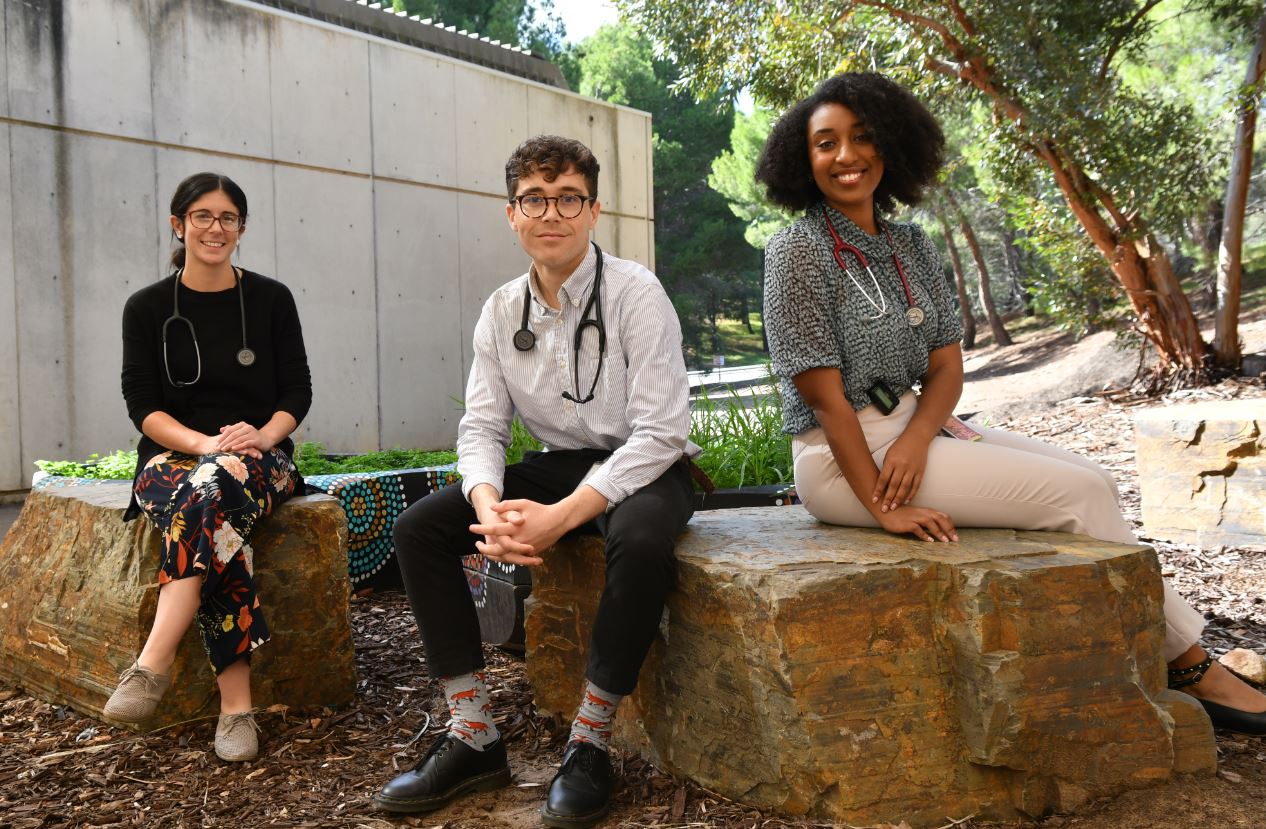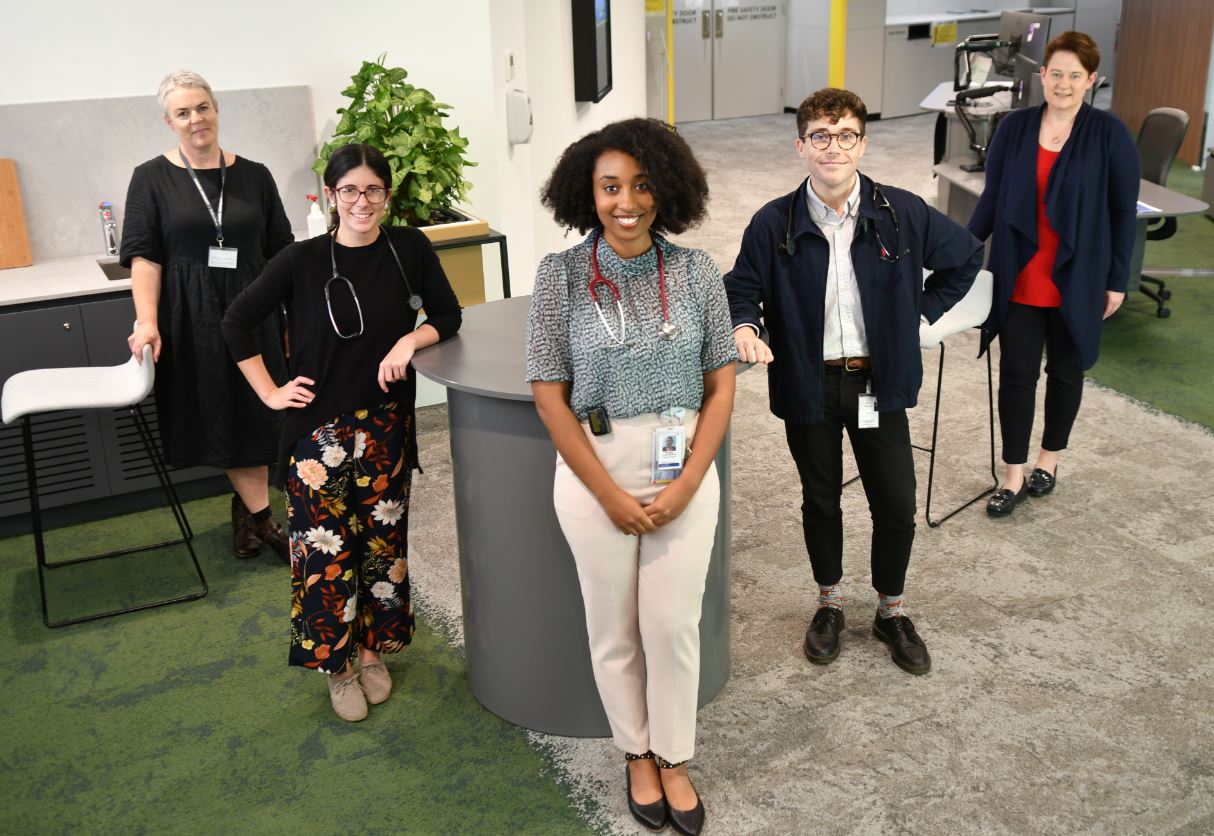
Final-year medical students Liam Ramsey, Pamela Gebrehiwot and Matilda Smale are preparing to transition to junior doctors during the COVID-19 pandemic.
In the midst of the crisis disruptions, hundreds of clinical placements remain crucial to the Flinders University students’ preparation for the workforce – at a time when the future of high quality health care is firmly in the spotlight.
“The pandemic has changed how we deliver health services in a safe and effective way,” says Liam, President of the Flinders Medical Student Society, who is working in paediatrics at Flinders Medical Centre.
“I strongly believe students are essential to teams and reflect the longevity of the workforce,” he says. “It’s therefore imperative to nurture and empower them, no matter the uncertainty in the clinical environment.”
At the same time, he says students contribute a significant emotional and empathy capacity to healthcare.
“We often have more time to sit with patients and connect with them. Patients often find students extremely comforting and their fresh energy uplifting. We should not forget the humanity that students bring and give to patients in our health care centres every day; it’s invaluable.”
Liam’s insights are reflected in a new article in the The Medical Journal of Australia.
The article, written by Liam Ramsey, with Flinders University Heaslip Fellow Dr Julie Halbert and College of Medicine and Public Health Education Dean, Associate Professor Alison Jones, concludes that Flinders University Medical Program (MD) students demonstrated great commitment to the health care system and their career during the challenging period.
“There is heightened anxiety among the existing workforce who are understandably concerned about the rapidly changing impact of the virus. This can lead to differing opinions among clinical supervisors as to the merits of continuing clinical placements,” says Dr Halbert.
“We addressed this by writing and widely distributing clear guidelines for clinical placements in partnership with medical students and health care provider partners.
“Flinders University is student centred and we went to great lengths to make these placements as safe as possible, including instigating refresher PPE training.
“In some high-risk placements such as endoscopy and other aerosol-generating procedures, we have encouraged the clinical supervisors and students to negotiate appropriate activities that do not increase the risk of COVID-19 exposure to either the student, other staff or the patients while still allowing the student to learn in the clinical environment.”
The importance of clinical placements for almost 300 Flinders University students in their final two years of Flinders University’s Medical Program has been summarised in The Medical Journal of Australia article.
“Removing students from clinical placements may not prepare them for their career in health care and may have significant implications for future workforce planning,” says Dr Halbert, adding COVID-19 has created many ongoing uncertainties across future health services.

The “real-life” learning of a clinical placement during the COVID-19 pandemic could prove “invaluable” for final-year medical students.
“Our final year students are the future medical workforce and it is our job to ensure they are competent, undifferentiated, work-ready practitioners,” says Associate Professor Jones.
“To date, students have chosen to remain on clinical placement.
“While they have concerns about their personal safety, they remain committed to both patient care and their own learning.
“Students have seen health system governance operationalised, witnessed senior clinicians act thoughtfully and with intent despite their own anxiety, and watched professional practice role modelled in the provision of good communication and a sense of humanity and compassion for sick patients.
“On-going evaluation of the actual educational experience that students are receiving will assist us in the provision of additional learning if deficits arise, and, in the worst scenario, help us to identify if clinical placements are no longer tenable.”
The article, ‘Clinical placements for medical students in the time of COVID-19’ and other related open access Medical Journal of Australia articles are available courtesy of the Australian Medical Association.
Flinders University’s co-location with Flinders Medical Centre, and close partnership with the Southern Adelaide Local Health Network (SAHLN), and other health care providers across metropolitan Adelaide, rural SA and the NT made possible the continuation of placements during the pandemic, says Associate Professor Rosalie Grivell, MD Program Director at Flinders University.
“Student leaders and the MD program leadership are grateful, now more than ever, for the strong relationships between students, academics, teaching staff and health care providers and mindful that when health care and education come together, everyone benefits – current and future patients, healthcare providers, and students,” says Associate Professor Grivell.

